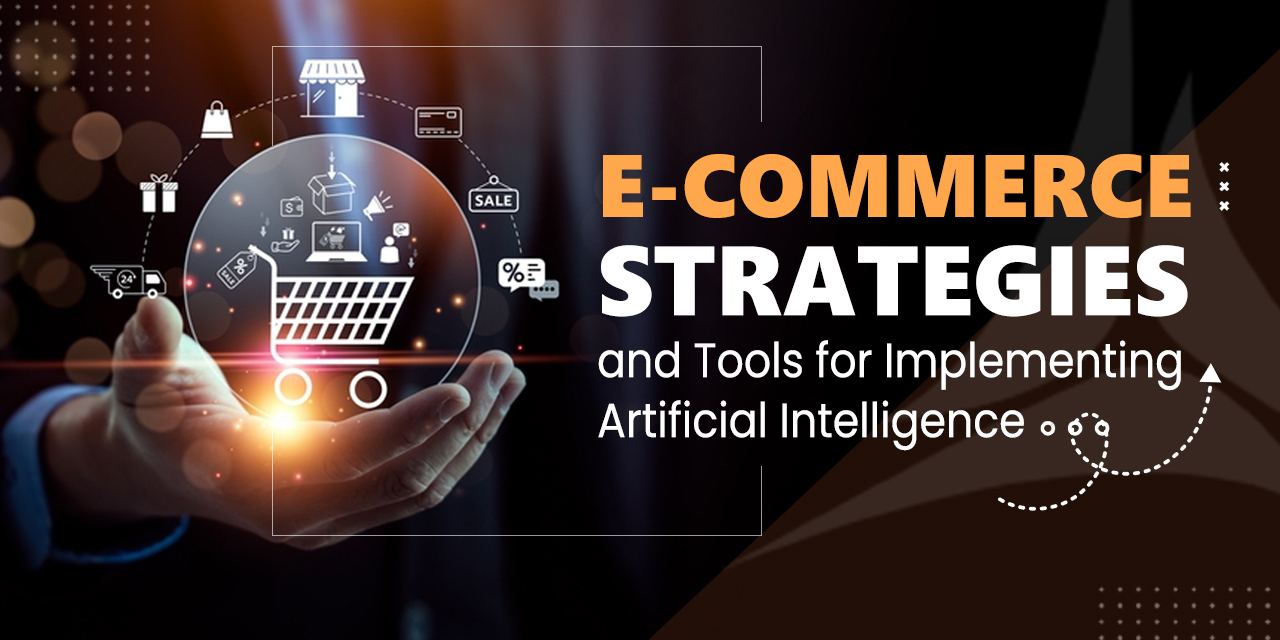
E-commerce: Strategies and Tools for Implementing Artificial Intelligence
AI- Artificial Intelligence is not a new term; it is integrated into many industries with a vision to uplift efficiency. Many industries have already adopted AI into business operations, while some are semi-AI developed, and some are contemplating the same. ECommerce is one of the industries that took the internet by storm; the industry is heavily digitalized. So, integration of AI into eCommerce is not only important but also helpful in bringing efficiency. eCommerce is roughly divided into procuring, inventory management, product listing, website maintenance, marketing, and selling. Incorporating AI into these segments can help the industry become more efficient and automated. Let us understand in detail about integration of AI into eCommerce:
Key Strategies for Integrating AI in E-commerce
There are various strategies to integrate AI in eCommerce that will help in SEO. Here are these:
● Voice search and virtual assistant: Voice recognition was $10 billion in 2020-21 and is expected to reach $50 billion as per Statista. Voice search and voice assistant have transformed into eCommerce. Countries like India, where consumers in remote areas fail to type for products, can easily use voice search. Thus, allowing eCommerce industries to seep into remote areas to acquire customers. AI integrated into voice search and voice assistant can enhance customer experience.
● Inventory management: AI integrated with inventory can bring efficiency and assist in growth. You can automate your inventory tasks and analyze real-time data to forecast sales to help you upgrade your inventory. With AI, you can ensure you have the necessary details and optimize inventory to avoid any issues.
● Optimization of marketing: AI can optimize your marketing campaigns in various aspects. There is a range of AI tools that help develop sales copy, automate email, and optimize social media marketing. AI tools like Jasper, active campaigns, and many more can assist in optimizing marketing campaigns.
● Personalization: AI integrated with search to offer personalization can result in various benefits for eCommerce platforms. The smart search features, which are termed “searchandizing” combine merchandizing with online search practices. Features of this include personalized product listing, navigation, smart product search, and autocomplete information.
Essential Tools for Implementing AI in E-commerce
There are various essential AI tools that you can implement in eCommerce. Using these tools can help businesses bring efficiency and drive growth:
Chatbots: Integrating chatbots is now common and essential as they help in customer support. By resolving quick customer queries, you can provide better customer support. For instance, DHL integrated AI chatbots where they allow customers to take location and delivery time updates through Amazon’s Alexa.
Amazon forecast: The Amazon forecast uses time series data with machine learning to forecast data. You can use customer and inventory data to analyze and predict information. It will allow users to maintain and organize inventory to ensure they improve sales.
There are many AI tools like Jasper, Google Cloud, Clerk.io, and more. When integrated with an eCommerce platform, it can bring efficiency and sales.
Case Studies and Examples
There are many real-time instances where implementation of AI into eCommerce. To give you more details, here are some of the examples:
Zara: One of the popular eCommerce fashion brands known for minimal to no marketing, Zara has also integrated AI. They use AI algorithms to analyze the sales data, which helps optimize inventory. Thus, allowing them to produce small batches creates fear of missing out among customers. In addition, they have offered virtual try-on options for customers. This allows their users to try clothes virtually using smartphones offering excellent customer experience.
Amazon: Amazon is one of the first eCommerce sites that we know across the globe. Over the years, they adopted technology to drive sales and enhance their customer experience. They have integrated AI into product recommendations by analyzing users’ product and search history. So, they provide a more personalized shopping experience to their users. In addition, they integrated machine learning algorithms in the supply chain network to analyze demand and manage inventory.
Similarly, there are many brands like Alibaba, eBay, Myntra, and many more using AI in their eCommerce business operations.
Future Trends in E-commerce AI
AI in eCommerce has brought a shift in the way eCommerce operations are conducted and improved customer experience. AI will continue to be part of eCommerce and will offer improved customer service. From personalization to inventory management, AI tools are going to become common among eCommerce industries. Many tools that are being used by large eCommerce industries will be followed by mid-tier industries. Thus, AI integration with eCommerce will become more efficient and important for the industry. In addition, generative AI is slowly entering into the field of eCommerce. According to Statista, generative AI will be seen in product recommendations. So, you can estimate the vast use of AI across the globe in eCommerce industries.





